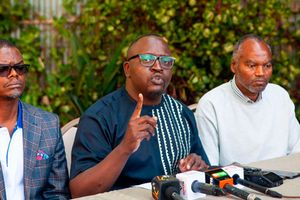Patients suffer as ministry, private hospitals feud over Sh20bn difference in bill

Members of the Rural and Urban Private Hospitals Association of Kenya (from left), Vice Chairman Joseph Kariuki, Chairman Dr Brian Lishenga and Simon Mbugua address journalists in Nairobi on February 20, 2025.
What you need to know:
- This is the third day since hospitals affiliated to Rupha suspended their services under SHA.
- Health CS Barasa asked the hospitals to submit all pending claims for verification and payment will follow.
A disputed Sh20 billion claim is at the heart of the row between the government and private and rural hospitals that is now threatening to ground seamless provision of services in healthcare facilities in the country.
On one hand, the government insists that it only owes the facilities about Sh9 billion after paying Sh10 billion which amounts to half of the undisputed claims last year.
On the other hand, however, Rural and Urban Private Hospitals Association of Kenya (RUPHA) and Kenya Association of Private Hospitals maintain they are owed about Sh30 billion cumulatively.
Stirring the hornet's nest, Social Health Authority (SHA) chief executive officer Robert Ingasira said the debt figure quoted by the association is incorrect.
The SHA boss insisted that all hospitals must provide proof of archived unreconciled claims to facilitate payment of their debt from the defunct National Health Insurance Fund (NHIF), one which is estimated to be about Sh20 billion.
“The reconciliation process between SHA and healthcare providers will continue until all outstanding NHIF debts are conclusively resolved,” said Mr Ingasira.
Nonetheless, RUPHA chairperson Dr Brian Lishenga disputed Mr Ingasira’s assertions, terming them a long con, saying hospitals may risk losing the disputed claims that the government owes them.
He said the SHA is being dishonest because the Sh30 billion is a national debt owed to all hospitals.
“This is a figure that is internal to SHA based on what they can see. Out of the Sh30 billion that we know, it is about Sh19 billion that was part of the undisputed claims. These are claims that had gone through all the stages and were ready for payment as at September 30, 2024,” said Dr Lishenga.
“The transitional committee reported that there were 2.7 million claims which were still in process and that figure is yet to be understood but it is estimated to be more than Sh20 billion,” he added.
While Mr Ingasira said that hospitals must provide proof of the disputed claims through the archives, Dr Lishenga said they don’t have access to that NHIF data and system anymore after the transition to SHA was made about five months ago.
“This is part of the reason why we have been insisting that reconciliation must be done without further delay because for those 2.7 million claims that were still in the process, the only person who has the record is SHA. They have closed the portal, providers don't have access,” said the Rupha boss.
“How do you even confirm that, yet you don't have access to the NHIF system? This matter must be sorted now. What if somebody interferes with that archive, and the record becomes inaccessible?” he asked.
This is the third day since hospitals affiliated to Rupha suspended their services under SHA.
Dr Lishenga said that instead of SHA inking a deal on the payment plan with them, they have now resorted to threats.
“We were talking about historical debt and that needs to be sorted out. Every time we start talking about historical debt, they start bringing in SHA issues because they want to say that NHIF does not exist and they are only dealing with SHA,” he said.
While appearing before the Senate on Wednesday, Health Cabinet Secretary Dr Deborah Barasa said the bone of contention between the government and the hospitals is the NHIF pending bill.
CS Barasa asked the hospitals to submit all pending claims for verification and payment will follow, saying the difference in terms of claims is the problem.
“Once we have addressed that, we believe we will be in a position to ensure UHC is implemented. We acknowledge that the private and faith-based organisations are a critical pillar in ensuring health services are delivered to Kenyans,” she said.
The minister pointed out that the total claims paid to date stand at Sh18.2 billion out of which Sh16.9 billion relate to SHIF claims while Sh1.3 billion are for primary healthcare capitation.
“We acknowledge the debt is there and this is the main problem with the faith-based and private health facilities. The concern is NHIF pending bills and not SHIF which we have been paying within 30 days instead of 90 days,” said the CS.
However, the minister told senators that the government is discussing a payment plan for the NHIF debt and the ministry has been engaging the National Treasury and various ministries, departments and agencies involved to ensure there is payment.
“The greatest concern is the NHIF debt and as a ministry we are looking at how we will pay the debt. This is what was critical in regards to the withdrawal of services by the affected hospitals and so what we have done is see how to have a payment plan for the debt,” she said.
SHIF Act, 2023 came into effect on November 22, 2023 repealing the NHIF Act, 1998. The commencement of the Act marked the beginning of transition from NHIF to SHA for a period of one year as stipulated in the new law.
CS Barasa said that during the transition period, NHIF continued to receive contributions and offered services on behalf of SHA up until September 30, 2024 with the NHIF accounts holding Sh1.4 billion.
SHA took over operations of NHIF on October 1, 2024, however, all the pending claims are still being processed and paid under NHIF, the CS said.
She admitted that there are claims payable amounting to Sh24 billion as of February 25, 2025 including for hospital claims, Linda Mama capitation and group life.
Dr Barasa said that since SHIF was rolled out on October 1, 2024 to receive contributions and provide medical services, it has collected Sh20.9 billion as of January 31, 2025 and the Fund has paid NHIF claims totaling to Sh8.6 billion.
Meanwhile, SHA’s chief executive Dr Ingasira appealed to the facilities’ associations on the frontline of suspending services because of unpaid debts to reconsider their decision.
“We encourage RUPHA members to continue working with SHA to ensure the uninterrupted provision of healthcare services. We appreciate all healthcare providers who continue to serve Kenyans as we work to resolve outstanding NHIF debt issues and other issues,” said Mr Ingasira.
He reminded all Kenyans that have registered and paid for SHA that they are entitled to free primary health care provided for in about 8,600 contracted facilities. This list is available on the SHA website and Huduma centres countrywide.
However, Dr Lishenga says that the capitation to hospitals on primary health care is not enough and most hospitals are now co-charging their patients resulting in out-of-pocket payments.
“They are putting too little money on the table, and what we do not understand since Kenyans are paying more under SHA than they used to pay under NHIF. Why is it that they are funding less under SHA than they used to fund under NHIF?” asked Dr Lishenga.






